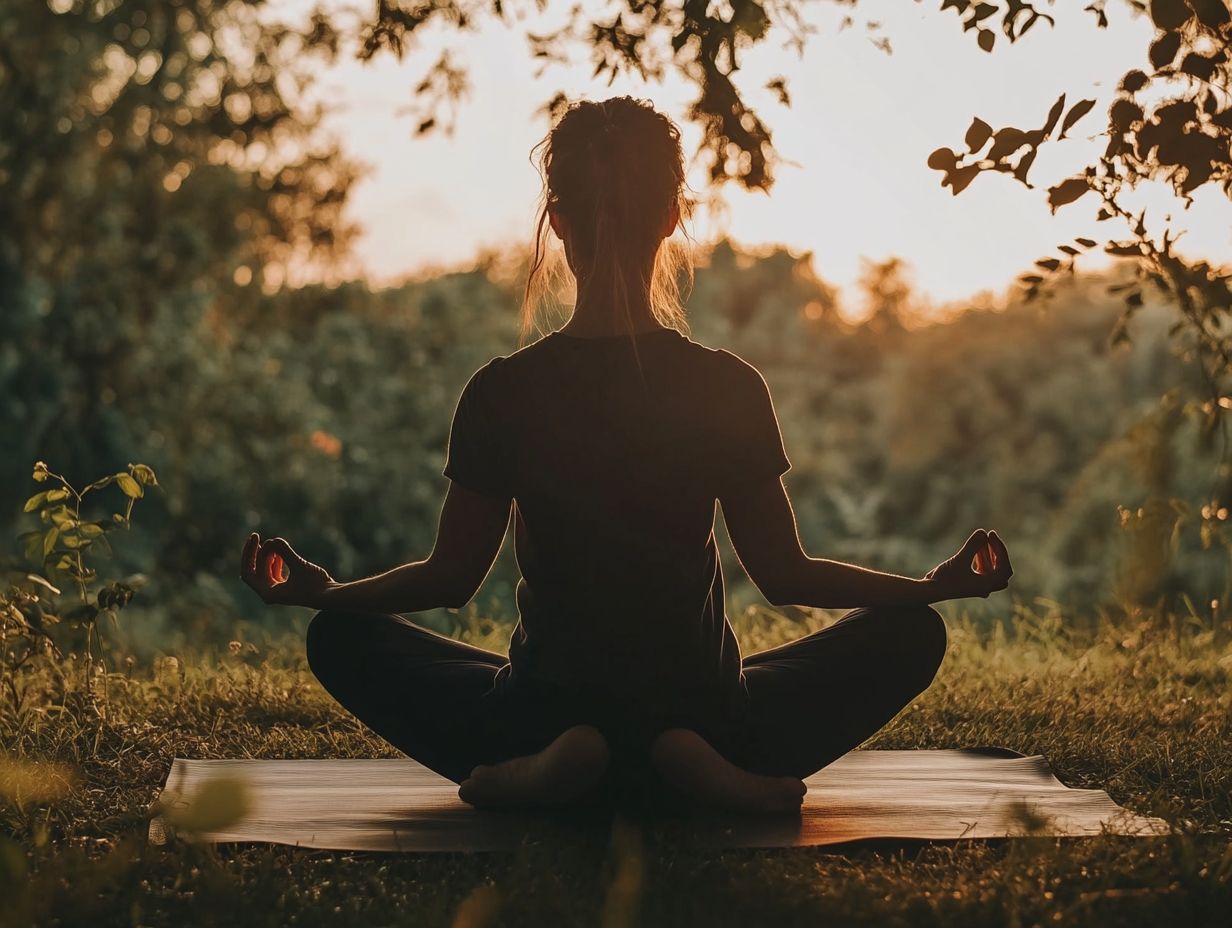How to Build Resilience with Mind-Body Practices
In a world brimming with challenges and uncertainties, your resilience has never been more essential. This exploration delves into the very essence of resilience, illuminating how mind-body practices such as meditation, yoga, and breathwork can fortify your inner self.
It emphasizes the vital role of social support, healthy habits, and self-care in nurturing your capacity to bounce back. Get ready to discover practical tips on seamlessly weaving these practices into your daily routine, empowering you to navigate obstacles with grace.
Uncover the keys to cultivating a more resilient version of yourself!
Contents
- Key Takeaways:
- The Importance of Resilience
- Mind-Body Practices for Building Resilience
- Incorporating Mind-Body Practices into Daily Life
- Other Factors that Contribute to Resilience
- Healthy Habits and Self-Care
- Challenges and Obstacles in Building Resilience
- Overcoming Setbacks and Maintaining Progress
- Frequently Asked Questions
- 1. How can mind-body practices help in building resilience?
- 2. What are some specific mind-body practices that can help in building resilience?
- 3. How often should I practice mind-body techniques to build resilience?
- 4. How can breathwork help with resilience building?
- 5. Can mind-body practices help in overcoming trauma and adversity?
- 6. How can I incorporate mind-body practices into my daily routine?
Key Takeaways:

Building resilience is essential for coping with challenges and setbacks in life. To enhance this, how to incorporate mind-body practices into daily life can be beneficial, as they promote mindfulness and relaxation through techniques like meditation, yoga, and breathwork.
Consistently incorporating these practices into daily life and maintaining a strong support system are key in building resilience and overcoming obstacles.
The Importance of Resilience
Resilience is a vital skill that equips you to navigate life s challenges and emerge stronger from adversity. It s all about maintaining your psychological well-being while confronting stress, setbacks, and other obstacles that can hinder your personal growth.
The science of resilience encompasses several dimensions, including emotional resilience, mental toughness, and the capacity to adapt to changing circumstances. Influential figures in this realm, such as Kelly McGonigal and Viktor Frankl, highlight that resilience isn t just a trait you re born with; it can be cultivated through intentional practices and tools.
By embracing this mindset, you can enhance your mental health and foster significant personal development.
Understanding the Concept
Understanding resilience means recognizing it as a complex concept deeply rooted in emotional and psychological aspects, both of which are essential for your personal growth. This insight is vital as you navigate the inevitable challenges and setbacks life throws your way.
Emotional resilience is your capacity to manage stress and overcome difficulties. Psychological resilience encompasses broader qualities like adaptability and mental fortitude. Both forms of resilience are central to the field of positive psychology, championed by influential thinkers like Martin Seligman, who stresses the importance of nurturing your strengths to enhance well-being.
Activities like mindfulness meditation, changing how you think about a situation, and journaling can boost your resilience. For instance, practicing gratitude through daily reflections allows you to cultivate a more optimistic outlook, ultimately strengthening your ability to bounce back from adversity.
Mind-Body Practices for Building Resilience
Mind-body practices are vital for cultivating resilience. They nurture emotional strength through techniques like meditation, mindfulness, yoga, and various relaxation methods, including how to overcome anxiety with mind-body practices.
These approaches not only bolster your mental fortitude but also enhance overall well-being by alleviating stress and improving psychological health.
Engaging in resilience activities like breathwork and mindful movement can help you navigate challenges while fostering a more balanced and harmonious life. For those interested in enhancing their connections, learning how to use mind-body practices for better relationships can be particularly beneficial.
Meditation and Mindfulness
Meditation and mindfulness serve as powerful allies in cultivating emotional resilience and enhancing your mental health. By weaving these practices into your daily routine, you can significantly lower stress levels and bolster your ability to navigate life’s challenges.
Engaging in techniques like focused breathing, body scans, and loving-kindness meditation allows you to train your mind to stay present, nurturing a deeper sense of awareness and acceptance. This heightened awareness doesn’t just ease feelings of anxiety and depression; it also promotes a more balanced emotional state.
As you consistently apply mindfulness and meditation in your life, you’ll gradually build mental toughness. This enables you to face adversity with calmness and clarity instead of reactivity, ultimately enriching your overall well-being.
Are you ready to build your resilience? Start your journey today!
Yoga and Movement

Yoga and mindful movement are key practices that boost your emotional strength and encourage personal growth.
Engaging in these activities helps you acknowledge and process your feelings.
As you practice mindful breathing and gentle stretches, you release tension in your body and mind. This connection elevates your mood and builds confidence.
Use techniques like guided visualizations and affirmations during yoga to nurture resilience and support your growth journey.
Breathwork and Relaxation Techniques
Breathwork and relaxation techniques are powerful tools for enhancing emotional resilience and managing stress. Practices like deep belly breathing and muscle relaxation can greatly improve your ability to handle life’s challenges.
Deep belly breathing calms your nervous system and creates a feeling of stability. Tensing and relaxing muscles helps release tension and promotes clarity.
Try the 4-7-8 breathing technique; it slows your heartbeat and helps during stressful moments. These methods build your emotional toolkit for regulation and resilience.
Incorporating Mind-Body Practices into Daily Life
Incorporating mind-body practices into your routine is vital for boosting your mental strength and emotional well-being.
Integrating these practices allows you to navigate challenges with ease and maintain a balanced mindset.
Tips for Consistency and Integration
Staying consistent with resilience practices is essential for your emotional health. When you make time for meditation, yoga, or deep breathing, you cultivate calm and improve your ability to tackle challenges. Additionally, exploring how to incorporate mind-body practices in nutrition can further enhance your well-being.
Even dedicating a few minutes daily can yield significant benefits. Start your mornings with meditation or stretching to reinforce positive habits throughout your day.
Other Factors that Contribute to Resilience
Many factors contribute to resilience, including community support, healthy habits, and self-care. Embracing these elements helps you navigate life s challenges with strength.
Social Support and Community

Strong social support and connections are vital for building resilience. These relationships provide strength during tough times.
Having friends or community members to encourage you makes a difference. Joining community initiatives like support groups or workshops can boost your emotional well-being.
Participating in activities like community gardens or yoga classes promotes health and fosters belonging. Meaningful interactions can help you overcome obstacles and build resilience.
Healthy Habits and Self-Care
Healthy habits and self-care practices boost your resilience. They enhance both your physical health and emotional well-being.
Incorporating activities like regular exercise, mindfulness meditation, and balanced nutrition into your daily routine can greatly reduce stress and anxiety. This enables you to cope more effectively with life’s challenges.
Building strong friendships can create a supportive network that fosters a sense of belonging and security. By prioritizing self-care rituals such as ensuring adequate sleep and dedicating time to hobbies you can cultivate a more positive outlook on life.
This, in turn, strengthens your ability to recover from setbacks and navigate adversity with grace.
Challenges and Obstacles in Building Resilience
Building resilience requires confronting challenges and obstacles that test your mental toughness. Embracing these trials shapes your character and fortifies your ability to navigate life’s complexities.
Overcoming Setbacks and Maintaining Progress
Overcoming setbacks is essential for building resilience, requiring both mental fortitude and emotional strength.
To navigate through challenges effectively, adopt strategies that cultivate a positive mindset and promote growth.
Emphasizing self-reflection allows you to uncover lessons within your struggles, transforming obstacles into invaluable learning experiences.
Surrounding yourself with supportive relationships is crucial; these connections offer encouragement and fresh perspectives during difficult times.
Setting realistic goals and celebrating small victories helps maintain motivation and reinforces your sense of achievement.
Ultimately, embracing flexibility and learning to adapt not only aids in your ability to bounce back but also solidifies your journey toward greater resilience.
Frequently Asked Questions
1. How can mind-body practices help in building resilience?

Mind-body practices such as meditation, yoga, and deep breathing techniques help build resilience by promoting relaxation, reducing stress and anxiety, and improving overall mental well-being. To effectively incorporate these techniques, learning how to make mind-body practices a habit can be invaluable.
2. What are some specific mind-body practices that can help in building resilience?
Specific practices include mindfulness meditation, Tai Chi (a gentle form of martial arts focusing on slow movements), Qigong, progressive muscle relaxation, and guided imagery.
3. How often should I practice mind-body techniques to build resilience?
While there is no set frequency, practicing at least a few minutes each day is recommended. Even a few times a week can be beneficial. Find a routine that works best for you.
4. How can breathwork help with resilience building?
Deep breathing exercises promote relaxation and reduce stress and anxiety. Focusing on your breath also enhances mindfulness, helping manage difficult emotions and situations.
5. Can mind-body practices help in overcoming trauma and adversity?
Yes, these practices can aid in overcoming trauma and adversity. They promote relaxation and improve mental well-being, assisting in managing and healing from difficult experiences.
6. How can I incorporate mind-body practices into my daily routine?
You can set aside specific time each day for practice, weave it into your exercise routine, or take short breaks to practice deep breathing or mindfulness exercises.
Start your journey to resilience today!






